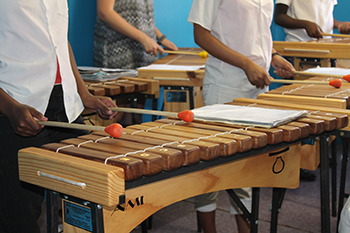
ROC children rock in marimba music
Photo: Valentino Ndaba |
Reach Our Community (ROC) Foundation in conjunction with the University of the Free State’s Odeion School of Music (OSM) held its first-ever music concert last month. Children who form part of the foundation’s Afterschool Care programme showed their impressive music skills to their parents and guardians in attendance.
ROC provides support to orphaned and vulnerable children from early childhood through to adolescence in the Heidedal community in Bloemfontein. The foundation strives to address the challenges resulting from factors such as poverty, unemployment, HIV/Aids, single parenting, lack of guardianship, and physical and sexual abuse. In the Afterschool Care programme, the children engage in educational, cultural, and recreational activities.
Going the extra mile
Since 2008, the UFS has successfully partnered with ROC through service learning and community engagement in which students from across all seven faculties participate. Two Music Education and Practice students from the OSM took it upon themselves to continue after their curriculum requirements were met.
Amy Viljoen- now a final-year BMus student, together with fellow student, Petre du Plessis, and their lecturer and programme coordinator, Gerda Pretorius, established the music class project in Heidedal in 2014. The students embarked on weekly trips to ROC, and would spend an hour working on the recorders and marimbas with children from ROC.
This year, Viljoen and Kara-Lynn Crankshaw, a final-year BA Music student, spent eleven months teaching the children music practice and theory, culminating in a concert that both the community and students can be proud of.
“I wanted to do something that was not only meant for educational purposes, but to give back to the community,” said Viljoen.
After having to gather extra chairs because of the influx of community members at the ROC hall, the founder, Patrick Kaars, said he had not expected such a turn-out. “It exceeded my expectations, and it was a dream come true. It meant so much to the children to be exposed to music, and to explore their own capabilities and talents.”
More children will learn how to play other instruments. Currently, the instruments used for the children’s training were purchased second-hand in order to cut costs. New music education specialists, who will join the programme in 2016, will also work with Pretorius to gather additional equipment, and compile learning material.
Kaars is also thrilled about the potential expansion to the music group, now that the concert has become an annual event. The OSM is also in the process of establishing a Centre for Music Development at ROC.